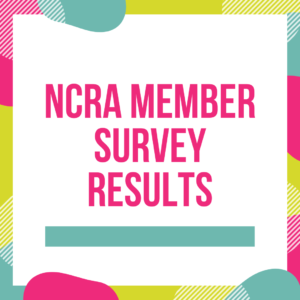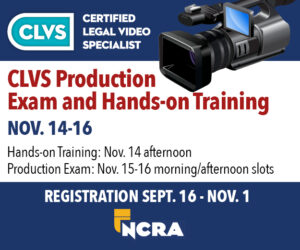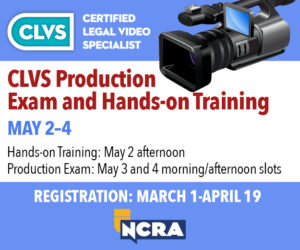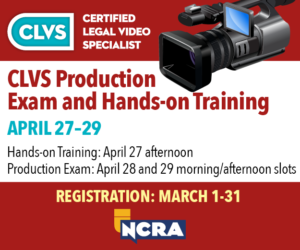By Robin Cassidy-Duran
After 25 years as a court reporter, I decided to branch out into the video world. Prior to January 2014 my video production experience consisted of borrowing a friend’s camera twice — maybe three times — over the last 30 years as my kids were growing up just to catch those special moments.
In high school, I had enjoyed photography class immensely, but that was long before video cameras became a household item. Still subjects were fairly easy to capture, and we learned the process of developing prints in the darkroom.
Ten years ago, I became a partner in a court reporting firm, and the demands on my time made it more difficult to remain a reporter in the field, produce transcripts, and manage an office. A few years ago, I made the decision to focus on the office, using my reporting skills perhaps once a week. Of course, as my time spent on my machine dwindled, it became more challenging to keep my writing skills up.
As a court reporter, I had observed many videographers over the years, and I sometimes envied their job as I struggled to get every word down on my machine. Although some videographers appeared more attentive than others, there were the few that sat in the back of the room reading emails, playing solitaire, or catching a few winks (or so I thought).
Granted, my knowledge of F stops and depth of field was a little rusty when I decided to pursue a career in legal videography, but everyone assured me that it was so easy. “I mean, really, how difficult could it be?” they said. “You can borrow my home video camera and try it out. Don’t worry about those lapel mics, lighting, or backdrops — that’s overkill.”
I decided that if I was going to do it, I wanted to do it right. I wanted to be taken seriously when I walked into the deposition. I wanted to know what I was doing — or at least have that appearance — so I started looking at the legal video certification process and earning the alphabet letters — CLVS, CDVS, etc.
Since I was already a member of NCRA, I decided to begin with their Certified Legal Video Specialist program. It consists of a two-day seminar followed by a Written Knowledge Test and a hands-on Production Exam. At the same time I signed up for the seminar in Atlanta, I noticed that they were offering the written test the week following the seminar. I thought, “How convenient! I can take that knowledge I’ve gained the weekend before and pass the written portion lickety-split.”
And then I arrived in Atlanta. I was handed the CLVS Guide to Video Depositions. And I opened the book and read and read and read and began to think, “What have I gotten myself into? This is going to be so embarrassing. I’m never going to be able to cram all of this knowledge into my pea-sized brain in three days in time for the written exam. What data can I purge so that I can implant this information in my head? Everyone has told me how easy this is going to be, but it’s not!”
I am not a natural born test taker. I’m sure you’ve all met a reporter who sailed through the test and exclaimed, “Wasn’t that a great test?” I exceeded the average of three tries to pass the RPR. As Benjamin Franklin said, “I didn’t fail the test; I just found 100 ways to do it wrong.”
I have to say that the instructors were fantastic, and they were able to teach a novice like myself what I should be doing out in the field. Taking that training with the fact that I studied like I haven’t in years and, miracle of miracles, I passed the written test three days later.
Fast forward one year: I attended NCRA’s TechCon 2015 in Denver, to attempt to pass the Production Exam. This consists of setting up a mock video deposition in a room of practicing videographers filming you while you are attempting to film them. I was informed ahead of time by well-meaning CLVSs that there were no tricks to this test. Take a deep breath. I’ve been doing this for a year. Right?
Well, as a reporter we all remember the famous words, “Ready? Begin.” What I should have replied was, “Nope. Stop everything.”
With heart pounding and lead-filled legs, I entered the test room. I proceeded toward the equipment to run through the various sound and camera tests before my deposition participants entered the room. I succeeded in turning the mixer off (no, it is supposed to be on) and back on and set the camera to my satisfaction.
Then the participants for the mock deposition entered the room (“Oh, dear. That can’t be him. I know that person. Why is he here? Why is he smiling?”) and the real fun began. After struggling to get refocused on what I was there to accomplish, I think I gave the proper admonitions to the parties. I say think of course because it is all pretty much a blur. What I do remember next is, “Is everyone ready? One moment please.” And I turned the power to the camera off.
Seriously. I turned the camera off. How much worse could this get?
Breathe. The power to the camera was restored, and we moved forward. The deposition began and I couldn’t wait for it to end. But it got worse – really.
I needed to zoom in on an exhibit and back out again. Normally this is not a difficult task but my arms felt like sandbags. My mind was saying I could do it, but my hands were not cooperating. I did some facsimile of zooming. All I could think of was, “Please beam me up, Scotty. Please!”
Well, it eventually ended. I passed. It wasn’t a pretty pass, but I’ll take it.
CSR, RPR, RMR, CRR, CRI, CLVS, CRC, etc. — in our reporting world, all of these letters demonstrate a level of competency. But they are more than that. These individuals who earn these letters are striving to improve and perfect their skills, stepping outside of their comfort zone and making changes in their lives that can lead to personal and professional growth.
Enjoying our comfort zone, of course, is fine unless we get so complacent that we hold ourselves back instead of challenging ourselves to improve and try new things.
I’d like to encourage you to continue striving to improve and perfect your skills even when it might seem or be difficult. Step outside of your comfort zone and make changes in your life that can lead to personal and professional growth. I’m sure glad I did.
Robin Cassidy-Duran, RPR, CLVS, is a freelancer and firm owner in Eugene, Ore.













